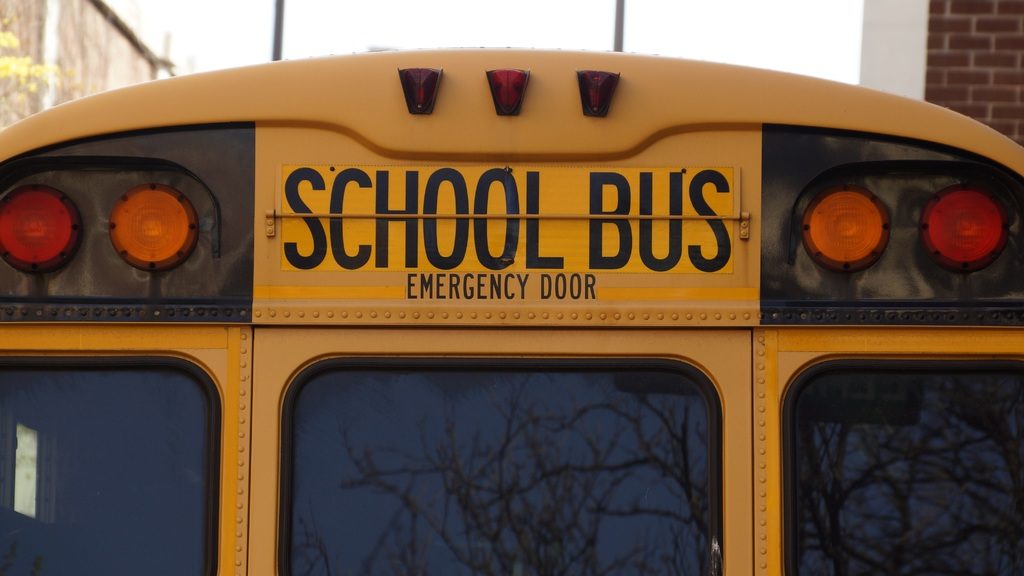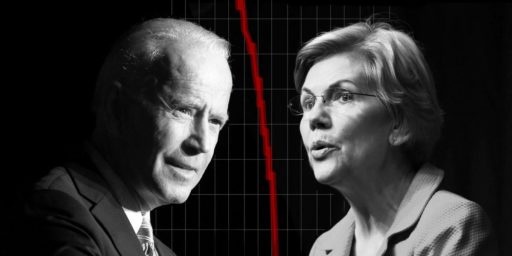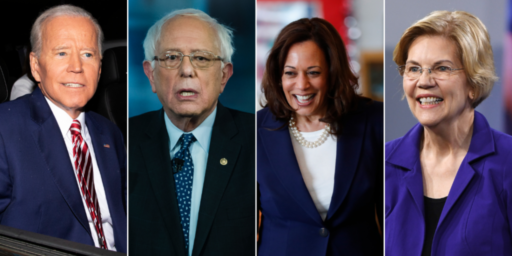Harris Softens Busing Stance
The surging candidate seems to be trying to snatch defeat from the jaws of victory.

After making hay in the first Democratic debate taking on frontrunner Joe Biden’s 1970s stance on busing, Kamala Harris inexplicably decided to make it a 2020 issue. She’s now backing off, at least slightly.
Sen. Kamala Harris said Wednesday that busing students should be considered by school districts trying to desegregate their locations — not the federal mandate she appeared to support in pointedly criticizing rival Democratic presidential candidate Joe Biden last week.
Harris had a breakthrough moment at the candidates’ first debate when she criticized Biden for his opposition to mandatory school busing when he was a senator in the 1970s. Harris said she benefited from busing as an elementary school student in Berkeley, California, in the early 1970s.
“That’s where the federal government must step in,” Harris said, looking at Biden and winning a burst of applause from the auditorium in Miami.
On Wednesday, though, Harris characterized busing as a choice local school districts have, not the responsibility of the federal government.
Busing, while not central to the Democratic primary, has become a proxy issue for the debate between Biden and Harris over race as well as broader questions about whether the 76-year-old former vice president is out of step with his party.After a Democratic Party picnic Wednesday in West Des Moines, Harris was asked by reporters whether she supports federally mandated busing.
“I think of busing as being in the toolbox of what is available and what can be used for the goal of desegregating America’s schools,” she responded.Asked to clarify whether she supports federally mandated busing, she replied, “I believe that any tool that is in the toolbox should be considered by a school district.”
—AP, “Harris says busing should be considered, not mandated“
To paraphrase Barack Obama, the 1980s called and wants its domestic policy back. Reviving the incredibly divisive debate over busing—which was polarizing to suburban whites but opposed by even many inner-city black leaders—decades hence seems an odd strategy.
I’m actually sympathetic to her revised position.
As noted in a recent post, I’m in the midst of moving to another house across the county at least in part because of the quality of schools. Because of the vagaries of my living arrangements, my children go to the only “8/10” elementary school around; several others within a very short drive are all 3’s and 4’s. Local busing could, with very little inconvenience, level out the disparities and turn all of the schools into 6’s — and provide incentives for my fellow well-off citizens to more fully fund all the schools.
One of the objections to the way busing was done in the 1970s and 1980s was that it was absurdly disruptive. Busing inner-city kids to the suburbs and vice-versa has kids getting up very early and not getting home until very late. It not only wastes a lot of time but also makes after-school activities and even playing with schoolmates after school next to impossible.
But there was also a very real, non-logistical issue: people who made the conscious decision to buy homes in the best school districts, usually at a premium, were justifiably outraged when their children were forcibly bused to inferior schools.
Yes, there was also a strong racial component to all of this. Part of the reason for the “good schools” in the suburbs was white flight and the ensuing de facto segregation. And the media and political leaders sometimes fanned the flames by exaggerating gang violence and other issues in the inner-city schools.
Still, there was a sense of being dispossessed. Parents played by the rules to get the best education for their kids and had it stolen from them.
My preferred alternative to busing would be to simply make neighborhood schools better and more equal. That would require a broader funding base and a willingness to pay more money for “other” people’s kids to get a good education. But it’s also the case that communities with more affluent parents are likely going to have “better schools” even if funding is equal because said parents are more likely to personally invest in their children’s education, be able to help with homework, supplement extracurricular experiences, and the like. But busing doesn’t fix those problems, anyway.






Her campaign must have realized that Federally-forced bussing remains highly unpopular even among many Democrats.
@Doug Mataconis: Yes, it’s a bizarre distraction. We ain’t gonna bus students to desegregate. That’s an issue from when we were kids. It’s time to move to the issues of the current day.
Kamala Harris’s campaign isn’t about ideas, it’s about beating Trump. Warren’s campaign is about ideas. The thing with Harris and Biden wasn’t about bussing, it was about Harris proving she’s fearless. That’s why she rose in the polls, that’s why this walk-back won’t matter.
Of course she did! I am old enough to remember the reaction to bussing at the time…and not just from whites either.
People should not have to be dragged out of their neighborhoods to get a decent education. Every child has a right to that no matter where he or she lives. Or should anyway.
This is typical for Kamala…her whole history is back and forth.
When she was a prosecutor she asked for harsher sentences after saying she would not. When she was AG she was accused of protecting cops from complaints from the community. Her truancy program hurt poor people.
This article I read in reason has an extensive background on her. Is all of it fair? Probably not, but the writer is a Libertarian and not a Republican and he has sourced the article.
@Doug Mataconis: Because some of the most segregation school districts are in Democrat-controlled urban areas. John Oliver even pointed that out when he did a segment on school segregation in 2016.
This certainly should be an issue and option that the local school districts decide. Schools operate better when the parents and school staffs work together to build successful schools. Judges and politicians should not be trying to run classrooms and schools.
@Terrye Cravens:
Yes, and we can dig in Biden’s past and find things we don’t like, ditto Warren and Buttigieg and Booker and Bernie. . .
It does not fcking matter. We are not at the Cheesecake Factory deciding on dessert, this is not about the perfect, this is about the survival of the United States, and I have no patience for trivializing the battle. I have one question for these candidates: do you have the skills to handle the Psychopath in Chief on a debate stage? Do you have the courage to put this pig Trump in prison? Yes or No? So far Harris looks like the best-suited for that job.
If we get two or more candidates who can gut Trump, then we can talk fine points of policy. But failing that, show me the killer.
@michael reynolds:
She did not appear fearless. She looked like she was attacking him. This is Joe Biden..what was he going to do? Touch her? Some people enjoy seeing people humiliated,I don’t.
She went after him for not supporting bussing and for working with segregationist Senators. Never mind the fact that most Americans did not support bussing. Never mind the fact that the chairmen of the Armed Services Committee, the Judiciary Committee and the Appropriations Committee were segregationists. And not working with them meant you could not get a bill to the floor.
As a prosecutor and as AG, Kamala Harris pushed for harsher sentences, protected cops, wanted more and not fewer reasons to lock people up. That is her record…say one thing, do another.
Ever hear of the truancy program that created problems for poor people such as the woman with a child who sickle cell anemia? Or the teenager Celeste Guap? She was used and abused by cops when Harris was AG and she declined to even investigate.
She is a politician who got her start through a relationship with an older and well connected man . This is not a secret. Willie Brown was her mentor and boyfriend. She was collected money from part time jobs he appointed her to when they were dating.
The point to what I am saying is that Harris is a politician.She knows how to manipulate people and create a narrative. People can say that her record just shows she was more interested in doing her job than she was in politics. That she did what she had to do…well, you could say the same thing about Joe Biden.
Unfortunately, the research Thurgood Marshall used to make the claims that he did in Brown, showed that it was the segregation itself that did the damage to student self-esteem, IIRC. Because of the nature of educational research, it’s certainly possible, even likely, that the cohorts studied that led to the conclusion were unique enough to make the conclusion invalid, but we didn’t do that type of metaresearch back in the day.
To some degree, what you note about the advantages of being raised with advantages is probably one of the more significant elements in the school quality debate (if not the most). Sadly, that makes “equal opportunity for education” a more elusive goal than we’d like to believe. On the other hand, fighting against the inertial forces of society and intellect is what education should be about anyway.
And if your neighborhood schools are different from one another for school policy reasons, your district is the reason Brown was decided the way it was to begin with and you should vote out your school board.
@Terrye Cravens: Look, we get that you don’t like the mean black girl. You don’t have to, but it might be good to look for ways that you can broaden your talking points to be more persuasive–unless “I just don’t like her” is the whole talking point, of course.
Because that is exactly what the Coleman Report (EEO) found. Busing was pure social engineering. Local resource differences among schools was small. Family background was the overall dominant factor. Busing was racist in the presumption by those promoting it that Black children would benefit from being in close association with White peers. That the results of the Coleman Report were ignored in favor of the presupposed findings of disparities in facilities is a long tradition in the social sciences where study findings that don’t support the presupposed theory is discarded.
Someone among the Democrats probably realized that promoting busing in the face of the recent history of the Obama administration and other Democrats doing everything in their power to keep poor black students out of charter schools or able to use vouchers might not play well with African-American parents.
Would we accept the levels of disparity in hospitals that we do in education? Or criminal justice? Or food safety?
If we leave things to the local level, this is what we get — a complete mishmash of quality based on property taxes and a “screw you, I got mine” attitude. Bussing is a bandaid put on the problem, and forced bussing is a bandaid forcibly put on the problem.
School districts have to be overseen by the county/city, and then the state, and then ultimately the federal government. Control being placed at whatever lowest level does a broadly adequate job. Right now, it’s pretty clear that funding and possibly oversight are at too low of a level.
Federally mandated forced bussing has its place — when every step below the federal has failed. And, it should be obnoxious and unpleasant, because we don’t want states to screw up things so badly that the federal government has to act.
It’s like federal prosecution of hate crimes. Get your act together at the state level, and then it shouldn’t happen.
@JKB: Is there a reason that you are using a report from 1966 as evidence?
Truth is universal and unchanging?
There haven’t been any studies since?
There haven’t been any studies since that showed different results?
There have been studies since, but the new conclusions are inconvenient?
You only have access to the von Mies Institute’s data bank and Coleman is the only study in it?
(I’m asking for a friend.)
@Terrye Cravens:
I was not aware that Joe Biden was running to be America’s precious ornamental vase.
If he cannot handle attacks, warranted or not, he is in the wrong line of business.
@michael reynolds:
Idle curiosity — I know you were a pretty early Buttigieg fan, has that faded or has Harris simply eclipsed him?
(I think he’s been stuck at the superficial introduction phase for a while — might be playing a wait-and-see game to watch other candidates and see what plays well, which would be both impressively smart, and impressively inauthentic)
@Just nutha ignint cracker: JKB also really likes to cite people from the early 1900s too… It’s almost as if he doesn’t want to acknowledge that the last 70 years happened.
@Gustopher:
I love mayor Pete, but a Trump vs. Buttigieg debate is showbiz vs. substance and I don’t like the odds of the American people preferring substance. Same with Warren. I think Trump would have a very hard time coping with Kamala Harris. I’ll write her a line: “Mr. Trump, don’t waste your time trying to intimidate me, I’m well-used to confronting criminals.’
Here’s another, when he inevitably takes a shot at her being short. ‘I don’t think you want to remind us all of… size issues.’
@Gustopher:
I know more about education than those subjects but . . . don’t we do that now? We have better criminal justice in every sense of the word in affluent, white communities. And certainly the affluent have better access to healthcare, including better hospitals. We’ve nationalized food safety regulations but we inspect it at the local level. I wouldn’t be at all shocked if the available food in poor areas were worse.